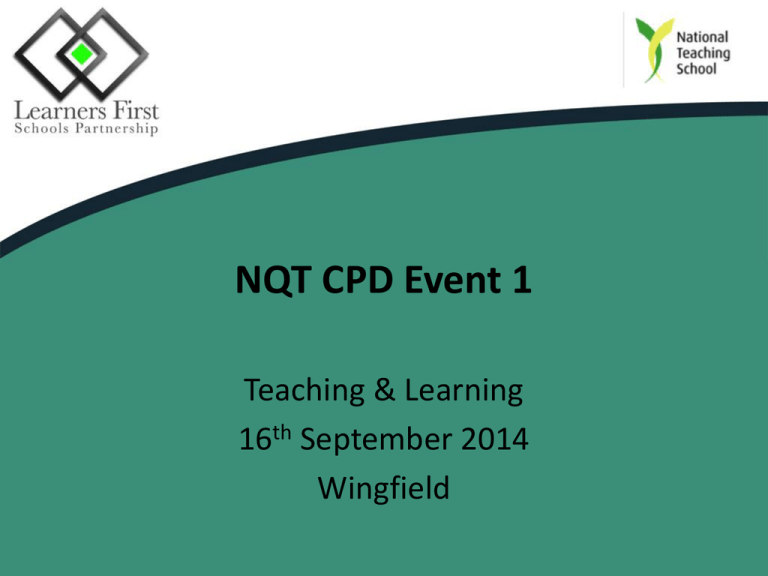NQT CPD Event 1 - Learners First
advertisement

NQT CPD Event 1 Teaching & Learning 16th September 2014 Wingfield Advice From Pupils • Video The Pyramid Masters Accreditation Judy Ogden Early Career Professional Development: a new programme for NQTs and RQTs Judy Ogden and Sean Cavan Links to your Teaching School Alliance NQT / RQT offer: The ECPD programme is designed to sit alongside and complement current professional development packages offered by your TSA / School / Academy. It has been co-designed and will be co-delivered with TSA colleagues to ensure that ECPD modules, learning activities and school/academy- based action research are informed by and relate to your NQT/RQT development programmes Impact of the ECPD programme for you - recognition of the learning and professional development that you achieve through combining professional practice with academic thinking for your school - uses small scale action research projects linked directly to school/academy improvement plans, focusing on the things that matter now for your students - developing your ability to develop them Programme outline The ECPD addresses: The Dynamics of Learning, Teaching and Assessment The Engaging Curriculum Securing Learners' Progress The Inclusive Classroom Leadership of Learning through Data Leadership of learning Through Staff An extended school/academy based action research project Module foci The Dynamics of Learning, Teaching and Assessment The Engaging Curriculum Securing Learners' Progress The Inclusive Classroom Programme outline The ECPD addresses: Leadership of Learning through Data Leadership of learning Through Staff An extended school/academy based action research project Module schedule: 1/2 day Saturday launch session at SHU 2 twilight sessions mid week at convenient locations Tutorial support via e-mail and phone Peer support from colleagues 1 SHU based writing session towards the end of each module Time frame: This will vary depending upon prior credits achieved. If you bring in Masters credits from a PGCE then typically 10 terms, if you don' t bring in prior credits then typically 13 terms The programme has been designed around the academic year in school and takes into consideration particular periods of increased workload and pressure. Breaks in study are therefore built in to accommodate these. Additional benefits: Access to the University Learning Centre Student Union Membership Access to online resources Networking opportunities with peers across the region. Costs: The cost of the modules will be spread across the programme and can be paid in monthly instalments. 15 credit modules = £ approximately 395 30 credit modules = £ approximately 790 Schedule for colleagues bringing in PGCE Masters credits module delivery credits cost * Dynamics of Learning, Teaching and Assessment June 14- Nov 14 15 £395 The Engaging Curriculum Mar 15 - Jul 15 15 £395 Securing Learners' Progress Sept 15 - Feb 16 15 £395 The Inclusive Classroom Mar 16 - Jul 16 15 £395 Extended School/Academy-based Action Research project Sept 17 - Jul 18 60 £1450 * to be confirmed Schedule for colleagues who are not bringing in PGCE Masters credits module delivery credits cost * Dynamics of Learning, Teaching and Assessment June 14- Nov 14 15 £395 The Engaging Curriculum Mar 15 - Jul 15 15 £395 Securing Learners' Progress Sept 15 - Feb 16 15 £395 The Inclusive Classroom Mar 16 - Jul 16 15 £395 Leadership of Learning Through Data Sept 16 - Feb 17 30 £790 Leadership of Learning Through Staff Mar 17 - July 17 30 £790 Extended School/Academy-based Action Research project Sept 18 - Jul 19 60 £1450 * to be confirmed For further information: Please contact s.cavan@shu.ac.uk j.ogden@shu.ac.uk NQT CPD Leads Top Tips • • • • • • • • • • • • • Samantha Hartley Oakwood Marie Hudson Oakwood Beth Carre Oakwood Andy Woodcock Dinnington Scott Gaynor Wickersley Amy Rozmus Brinsworth Debbie Elsdon Brinsworth Stan Chapman Wingfield Louise Stephenson Wickersley Richard Pearson Winterhill Melvin Palmer Thrybergh Paul Stanton Wales Ramona Fletcher Wales Sam • Setting Objectives • Instead of setting a levelled objective stating what pupils will learn by the end of the lesson, set an objective stating what they will have learned by a certain time in to the lesson, e.g., after 25 minutes you should have all recalled your learning about World War 2 and applied it to the timeline. • • Why is it successful? It splits the learning up to in to manageable chunks; it provides pace; there is a manageable goal to aim for; it creates a point where progress can be checked and misconception addressed. G. Petty Marie Amy and Debbie • Using the play-dough, you have one minute to model anything about your day today. • You will be asked to explain this to your shoulder partner. • You have 1 minute to explain your model to each other. Immediate Engagement Brinsworth Comprehensive School Debbie Elsdon Amy Rozmus Create intrigue in your lesson from the beginning: • Doesn’t have to be related to the lesson/topic although better if you can! • No fail questions are good. • Go for 3 minutes rather than 5. Make them work quickly! Use interesting images: Que es el problema? What do you think this image is? What could be happening in this image? There is no right or wrong answer! What has happened? Why? How? Use interesting images: Think of FIVE questions you would like to ask about this image. These people cause flooding in a country hundreds of miles from their home. How? Ask interesting ‘big’ questions: • • • • • • • • • How could ICT stop a forest fire in Portugal? When does a plate become a bowl? Can machines have feelings? If a Christian’s destiny is controlled by God, can he/she be blamed for anything? Does a computer hard drive weigh more when it is full than when it is empty? Would you rather go to heaven or remain immortal on Earth? Has technology made humanity less human? Is the past more important than the future? Which is heavier: love or hate? What's the question? • The answer is: Bewildebeast! • Five ways to confuse: – A badger – A kettle – A volcano – Henry VIII When ducks cry! • List five ways to make the following cry: – Duck – Squirrel – Curley’s wife – A plant Create codes to crack – make it a competition: A = E B = N C = J D = R E = H F = Z G = L H = X I = P J = C K = G L = T M = Y N = W O = U P = A Q = M R = Q S = V T = D U = K V = S W = F X = B Y = O Z = I A-Z Grid – Competition This can be used for any topic and can be revisited at the end of a lesson/week/topic to show progress Spot the odd one out The Nurse Romeo Mercutio Capulet Verona Juliet Shakespeare Tybalt Rosaline Triominoes Can be used to introduce new content/revision/ grouping Set Learning Groups Nigeria Ghana Africa Zimbabwe Sierra Leone Other top tips… • Target questions at students, rather than hands up • Wait time • For card sorts, have a few blanks “up your sleeve” as an extension. • Plan your learning outcomes at the end. Scott Paul & Ramona Andy Woodcock My top tip is be about non-verbal behaviour management techniques and challenging specific behaviour. What can be the most effective way to: • Ask a student to take his/her coat off? • Do up his/her tie? • Get back on task? Challenge Shouting out? • Sit in the place you want him/her to? • Challenge behaviour that is disrupting a teacherled activity? Andy Woodcock Andy Woodcock Stan • The most important resource in the classroom is not the inter-active board ,it is not your set of white boards, it is not your lollypop sticks with the students’ names on; it is you. You must look after this resource because without it nothing can happen. The resource needs feeding, it needs rest and it needs companionship. Top tip: pace yourself, keep something in the tank, don't give your all in period one because you will not have anything left for period two… or period three. Top Tip, the students should be working harder than you are in the lesson. What CPD do you want? • School-based experience • Reflect on your targets from your training and use these as a starting point. • What experiences would benefit your development and, thus, the pupils’ progress? • Do you want to see outstanding teachers in a specific subject? • Do you want to learn more about differentiating for individual learners or groups of learners? • Do you want to see examples of specific resources or topics or iPads in action? Website • • • Our new website is in production!! Once completed and live, all NQT’s will be able to access all of the resources and materials that will be used within your CPD sessions electronically! An email will be sent to you once the Learners First Website has gone live! Details Form • Please complete the details form and hand it to Louise.







